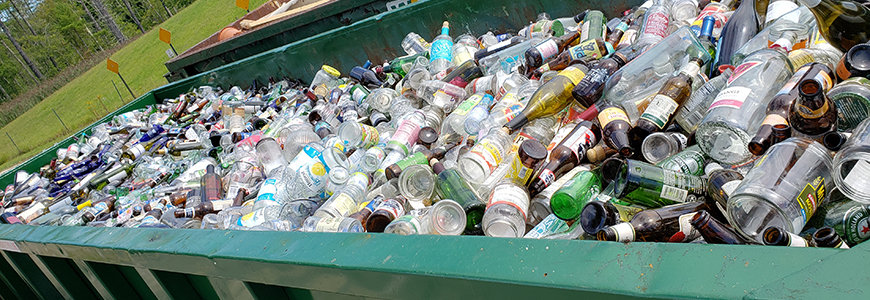This article is about recycling and composting your waste products, written by Patrick R. McElhiney, who founded Barrington Town News.
Recycling
The Barrington NH Transfer Station, also known as the Barrington NH Recycling Center, is a facility that provides a place for Barrington residents to safely dispose of their trash, recyclables, and other materials. For materials that are not recyclable, you can purchase trash bags to throw out the garbage at this center. There is also a large item garbage container. Any garbage disposal must be paid for with the appropriate fees.
The Transfer Station accepts the following materials in its single-stream recycling system:
- Paper Products (except shredded paper)
- Cardboard and Paperboard Boxes (must be flattened down)
- Plastic Bottles & Containers (#1, #2, and #5)
- Steel, Tin, & Aluminum Cans
- Paper Cardboard Dairy and Juice Containers
- Glass Bottles & Jars
Recyclable containers must be empty and dry, and there must not be any liquid or food waste residue in them. All recyclables must also be removed from plastic bags.
The Recycling Center doesn’t accept the following materials:
- Plastic Bags, Film/Sheeting & Flexible Film Packaging – you can recycle them at MarketBasket at the front of the store.
- Food Waste – you can recycle most food waste with a compost pile in your yard.
- Tissues & Napkins – you can place these in your compost, or throw them out.
- Polystyrene Foam / Plastics #6 – you must throw these out with the trash. For foam ice coolers, you leave them at the transfer center for someone else to pick up and use.
- Plastics #3, #4, and #7 – you must throw these out with the trash.
- Medical Waste – you will need to dispose of biohazard waste, such as needles and syringes at your doctor’s office.
- Tires – you must throw these out in the large trash bin.
- Hoses – these will need to be thrown out with the trash.
Other Recyclable Materials accepted by the Transfer Station, which may involve an additional fee, include:
- Appliances and Electronics – these need to be placed in the appropriate shipping container.
- Textiles and Clothing – these can be deposited in the yellow container. There is no fee for these materials.
- Scrap Metal and Metal Auto Parts – these can be placed in the appropriate shipping container. There is not usually a fee associated with this recycling.
Did you know that Market Basket recycles plastic bags?
You can recycle all your plastic wraps and plastic bags in the bin at the front of the store marked “RECYCLE” and “DEPOSIT HERE”. Many people use plastic bags to throw out the garbage, but all the plastic bags that you don’t use to contain garbage, and any plastic wraps that you get from food products or other types of product packaging can be melted down to make new plastic bags.
Composting
Another process to recycle most of your food waste is with a composter. You can buy a kit from Amazon that you can contain all your food scraps, and purchase some compost starter to add to it, and lots of bugs will come and eat your excess food waste. When you throw out your compostable food waste, such as vegetables, eggs shells, pieces of bread, and other foods excluding dairy and meat products, it creates methane gas that leaches out of the dump into the environment. Methane gas is just like propane, and it’s worse than the CO2 exhaust that comes from coal-burning power plants, vehicles and other types of motors. It’s easy to compost, and the only time you must smell it is when you’re adding more food waste into it. After the bugs have decomposed all your food waste, you can use the compost in your gardens or on your lawn. It provides a lot of nutrients to plants and grasses that will help them to grow better.
In our home, we’ve reduced the amount of refuse that we throw out to the dump to less than one bag per week. This may vary based on your family size, but if you’re constantly hitting your limit as to how much trash you can throw out, you should consider all these options. Not only will you be helping to save the environment, but you’ll also be repurposing almost everything that you currently throw out. All this includes is perhaps one trip per week to the recycling center in Barrington, organizing your waste streams, and a one-time purchase of a composter with starter, and you’ll be an environmental protection champion!

















